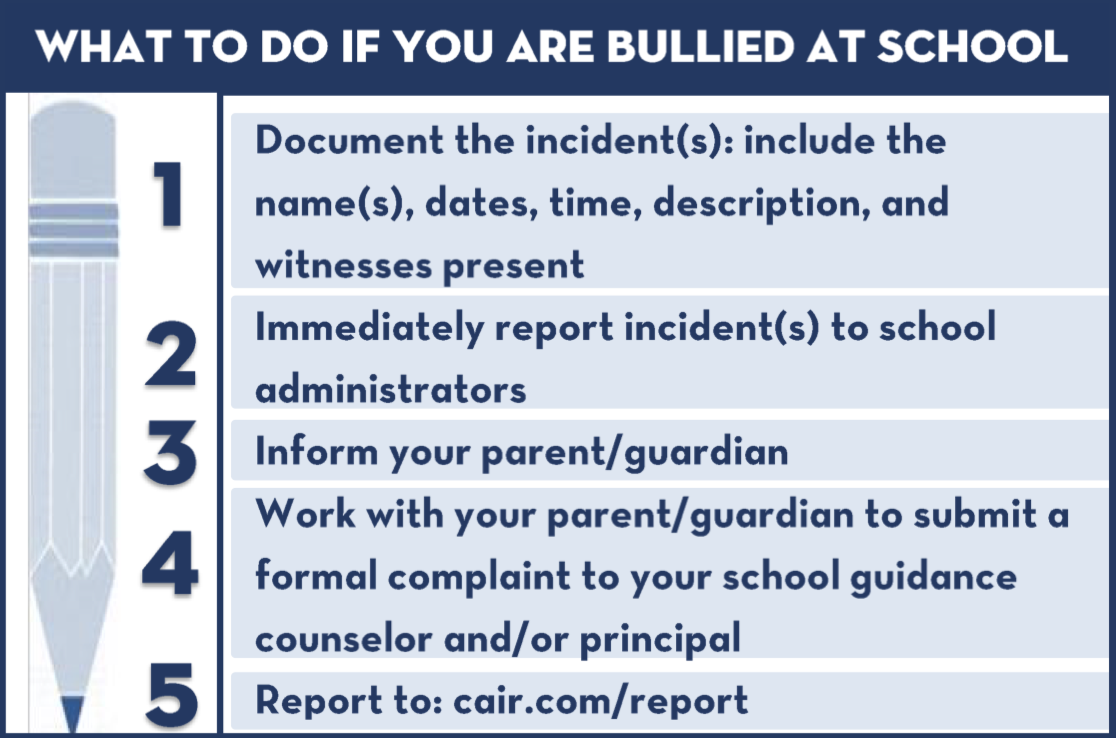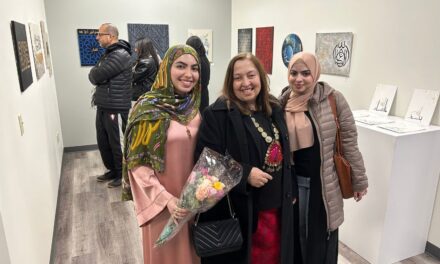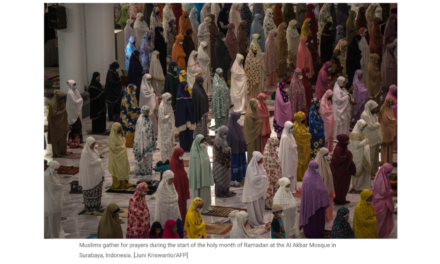Ayan Ajeen as “‘CAIR Marks National Bullying Prevention Month with Release of Anti-Bullying Guide for Muslim Families” for the Council on American-Islamic Relations
CAIR – San Francisco Bay Area Facebook Page
BIAS AND BULLYING: EMPOWERING MUSLIM CHILDREN IN THE AGE OF ISLAMOPHOBIA
It is no secret. In this age of Islamophobia, Muslim children suffer from bullying, bias, and alienation that gets little to no serious attention by the mainstream public.
According to recent studies, Muslim students in public schools face bullying at twice the rate of their non-Muslim peers and nearly half of Muslim families report at least one bullying incident over the last year.

Even worse, over half of Sikh students who wear a turban, and are mistaken as Muslims, are bullied because of their religious identity.
Although federal, state, and local governments, in cooperation with school districts, have done a lot to address the problem of bullying, it is not enough. Evidence suggests that Muslim and other religious minority children and their families lack confidence in the ability of schools to address the issue. Teachers and administrators themselves also report that they lack the resources and training to deal with issues around religious and cultural sensitivity and responsiveness effectively.
Although federal, state, and local governments, in cooperation with school districts, have done a lot to address the problem of bullying, it is not enough. Evidence suggests that Muslim and other religious minority children and their families lack confidence in the ability of schools to address the issue. Teachers and administrators themselves also report that they lack the resources and training to deal with issues around religious and cultural sensitivity and responsiveness effectively.
Our communities and families must empower themselves. From children to parents, from Imams to youth leaders, and from young to established professionals, everyone must do what they can to stop the spread of bigotry, hate, and Islamophobia in our schools.
As part of this effort, CAIR is providing this set of key recommendations for families and communities during National Bullying Awareness Month. Remember, the suggestions here are only a starting point. To be effective, guide your efforts by the principles CAIR follows in all of its work:
Defend Yourself by Knowing Your Rights in schools, the workplace, and the law.
Educate Yourself and Your Community with professional advocacy and engagement.
Empower Yourself and Your Community with professional advocacy and engagement.
You Are Not Alone:
Advice for Youth, Parents, and Community Members
Unfortunately, incidents of bullying and bias occur every day. Thankfully, there are resources around us that can provide a solution to the problem of a racist bully, a vindictive teacher, or an unaware administrator. Here are some suggestions to help guide you through the situation.
Empower Youth — Students know the problem the best and often have the best solutions, so listen to them, and let them lead. Researchers have found that students use technology, communication, and problem solving in unique and creative ways. Empower them: not only will the issue get handled quickly and effectively, but you are also investing in building great leaders for the future.
Mitigate, Don’t Instigate — It is natural to get upset and anxious when your child or someone in your community is treated unfairly. It gets even worse when you feel like you are not being taken seriously or listened to. But it is the responsibility of parents and school officials to protect students, reduce tension, and find long-lasting solutions. So, stay calm and focus on fixing the problem at hand.
Build Relationships, Be Proactive — Community members should build relationships with teachers and administrators long before a problem arises. Local mosques and community centers should invite teachers for open houses and offer to provide information sessions about Islam and Muslim cultures at local schools. You can also host book clubs and movie nights to help educate and build community.
Bring the Experts, Don’t Do It Alone — In every community around the country there are experts in universities, school districts, and community organizations that can help manage the problems our students and families face. So, bring the experts to help intervene. If you can’t find them, contact us. We can help identify conflict resolution experts, diversity specialists, and instructional experts.
Don’t Reinvent the Wheel — Every school and school district has resources available to address diversity, bias, and bullying. All schools may not be ready to address the needs of Muslim students, but with professional advocacy and research-backed engagement, schools can quickly adapt and become effective partners in creating healthy and safe communities for us all. So, explore and research what already exists and make it better.
How to Defend, Educate, and Empower Yourself
Remember, there are many resources to help us all get through the challenge of bullying and bias in public schools together. This is a short list of some great tools and reports to strengthen your efforts.
KNOW YOUR RIGHTS AND DEFEND YOURSELF. CAIR has put together a package of “Know Your Rights” guides in multiple languages to ensure that our diverse communities can be prepared to engage their local schools. You can access them here.
EDUCATE AND EMPOWER YOURSELF AND OTHERS. Before you can be an effective partner and problem solver, you have to be sure that you are empowered with the latest research and information. It is also often the case that school administrators need more information about the subject before they are ready to act and make effective changes. Here are some resources to help inform you and others:
CAIR-California has conducted surveys and research on the bullying and bias Muslim students face to develop two critical resources:
• Their 2015 report, Mislabeled, contains a solid snapshot on the state of the problem.
• Their Educators Guide addresses common questions and misconceptions about Islam and Muslims.
The problem of Islamophobia in general and the rising rates of anti-Muslim hate crimes and bias incidents have been documented for years by CAIR in a series of reports. Educate yourself on these elements by reviewing the following:
• The Bias Brief: Trump’s Impact on Anti-Muslim Bias
• 2018 Civil Rights Report: Targeted
• Hijacked by Hate: American Philanthropy and the Islamophobia Network
The Institute for Social Policy and Understanding and American Muslim Health Professionals released a comprehensive report, Religious-Based Bullying: Insights on Research and Evidence-Based Best Practices, on the state of the problem with leading experts around the country with special attention on the impact of bullying on mental health. Additionally, the Sikh Coalition has developed extensive materials on of bullying in their community that is useful for communities and allies facing similar problems.
For teachers interested in teaching about the problem, there are great resources available, including:
• Creating Cultural Competencies for dealing with the subject of Islamophobia. This resource contains a curriculum, supplementary resources, and trainings.
• The National Endowment of Humanities project, Muslim Journeys, has content on the history of Islam and Muslim cultures in the United States and in global history.
Let’s Work Together
If your community is ready to deal with the problem of bullying on a systematic basis, CAIR is prepared to work with you, provide resources to help manage the issue, and make a long-term impact. Here are some things we can do together:
CONDUCT A SURVEY in your local community. CAIR is working with mosques and organizations around the country to develop and implement surveys about bias and bullying in their local public schools. Together, we can gain a better understanding about the nature of the problem in your neighborhood and work to build a network of organizers who can help put an end to the issue.
HOST A TRAINING OR WEBINAR for community leaders and organizers. If people are interested in addressing bullying but don’t know where to start, we can host an in-person training or an online webinar to provide stakeholders with the latest information and tools needed to move forward and discuss the unique needs of their community.
HOST A TOWN HALL discussion. We have convened stakeholders and experts on bias and bullying in schools and can help you design a community wide discussion to make it a priority.
CONVENE A BOOK CLUB OR HOST A FILM SCREENING. This is a great way to engage parents, children, and families. Building upon years of experience, we can help you design and host these events.
ENGAGE AN EXPERT. We can help you connect to local experts to engage with the issue at a deeper level and build a network of advocates who can serve your local needs.














